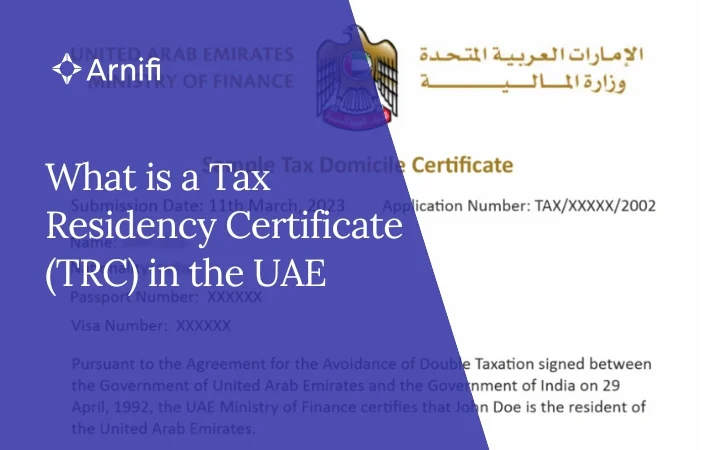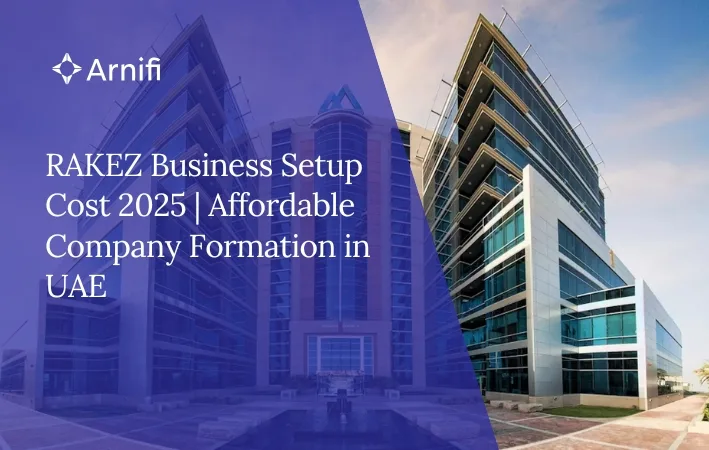How to Qualify for VAT Exemption in UAE
by Shethana May 27, 2024  14 MIN READ
14 MIN READ

VAT Exemption in UAE?
Financial services in the UAE are excluded from VAT in a number of unique ways. When express costs are imposed, such commissions or rebates, they are standard-rated at 5%.
On the other hand, some financial services are free if you receive payment through an implicit spread or margin, which eliminates the need for an explicit fee. There are several products and services that are VAT-exempt. As a result, they are not charged the regular 20% VAT and are not liable to VAT. Health care, education, and insurance are examples of exempt goods and services.
- VAT exemption in the UAE is granted to specific sectors and transactions to promote economic growth and affordability.
- Exempt sectors include financial services, residential buildings, bare land, local passenger transport, and refund opportunities for tourists.
- Understanding the distinction between zero-rated and VAT-exempt sectors is important for businesses to determine their tax obligations.
- Eligible sectors for VAT exemption in the UAE include financial services, real estate, and educational services.
- The process of qualifying for VAT exemption involves applying to the Federal Tax Authority (FTA) and submitting the required documentation.
- VAT compliance for exempt businesses requires maintaining records for VAT-exempt transactions and following proper record-keeping practices.
Introduction
VAT Exemption: Navigating the intricacies of the VAT exemption in the UAE can be a complex process for businesses and individuals alike. The UAE implemented a value-added tax (VAT) system in 2018, with a standard VAT rate of 5%. However, certain sectors and transactions within the Emirates are granted exemptions, offering relief from this tax to promote economic growth and affordability.
Understanding VAT exemption is crucial for businesses operating in the UAE, as it determines their tax obligations and compliance requirements. VAT exemption refers to the exemption granted to specific sectors or transactions, meaning that no VAT is charged on the supply of goods or services within these sectors.
Understanding VAT Exemption in the UAE
VAT exemption in the UAE is governed by the Federal Decree-Law Number 8 of 2017, which regulates VAT in the country. This law outlines the specific sectors and transactions that are exempt from VAT, reducing the tax burden on essential services and sectors. The implementation of VAT in the UAE is part of the government’s efforts to diversify its revenue sources and reduce dependency on oil-related income. It is essential for businesses to understand the VAT exemption criteria to determine their eligibility and comply with the tax system.
Defining VAT Exemption
VAT exemption refers to the exemption granted to specific supplies of goods or services from VAT. In the UAE, certain sectors and transactions are declared as exempt supplies, meaning that no VAT is charged on these supplies. This exemption reduces the tax burden on essential services and sectors, contributing to economic growth and affordability.
On the other hand, taxable supplies are the supplies of goods or services on which VAT is charged at the standard rate of 5%. Businesses providing taxable supplies are required to register for VAT, charge VAT on their supplies, and submit VAT returns to the Federal Tax Authority (FTA). Understanding the difference between exempt supplies and taxable supplies is crucial for businesses to determine their tax obligations and comply with the UAE VAT system.
The Importance of VAT Exemption for Businesses
VAT exemption plays a crucial role for businesses in the UAE, especially those operating in exempt sectors. One of the key benefits of VAT exemption is the reduction in input tax for businesses. Input tax refers to the VAT paid by businesses on their purchases or expenses related to their business operations. In exempt sectors, businesses are not able to recover the input tax they have paid.
However, businesses in exempt sectors are still required to maintain proper records of their exempt transactions and submit VAT returns to the FTA. This ensures transparency and compliance with the UAE VAT system. Despite not being able to recover input tax, businesses in exempt sectors can still benefit from the VAT exemption by attracting customers who are not required to pay VAT on their goods or services. This can contribute to the growth and competitiveness of the businesses operating in these sectors.
Eligible Sectors for VAT Exemption
Several sectors in the UAE are eligible for VAT exemption, including financial services, real estate, and educational services.
Financial services encompass a wide range of activities, including banking, insurance, and investment services. Real estate covers the sale and lease of residential buildings, while educational services include the supply of educational courses and training programs. Businesses operating in these sectors need to understand the specific criteria for VAT exemption and comply with the tax regulations applicable to their industry.
Financial Services and Their Exemption Criteria
Financial services in the UAE are subject to specific criteria for VAT exemption. While some financial services are standard-rated at 5% VAT, certain services are exempt from VAT when compensation is received through an implicit margin or spread, meaning no explicit fee is involved. Here are the exemption criteria for financial services:
- The issuance, allotment, or transfer of equity or debt securities
- Life insurance contracts and reinsurance provisions for these contracts
- Financial services aimed at recipients outside the GCC (zero-rated)
For intra-GCC transactions, VAT implications depend on whether the recipient is VAT-registered in their GCC state. If the recipient is registered or should be registered for VAT in their GCC state, the supply is considered outside the scope of UAE VAT, and the recipient handles the reverse charge mechanism. If the recipient is not registered or required to be registered, the supply retains its VAT liability in the UAE. Financial services imported from outside the GCC are subject to the standard VAT rate if they are standard-rated within the UAE.
Real Estate and VAT Exemptions
The supply of residential buildings in the UAE is subject to VAT exemptions under certain conditions. The ‘first supply’ of a residential building, whether through sale or lease, is zero-rated if it occurs within three years of the completion of the building. This encourages property development and helps make new homes more affordable for residents.
However, any supply of residential buildings after this initial period is exempt from VAT. This means that no VAT is charged on the transaction, but the supplier cannot recover VAT on related costs. It is important for businesses in the real estate sector to be aware of these VAT exemptions and comply with the regulations to ensure proper tax treatment for their transactions.
How to Avoid VAT Fines and Penalties?
- If your company generates more than 367,000 AED in income annually, you have to register it for VAT.
- File a monthly VAT return if your company makes 150 million AED or more in revenue annually. Make sure to file quarterly if not.
- Make that the tax invoice is sent out for each supply within 14 days of the supply date. Make that the registrant making the supply is listed with their name, address, and TRN.
- Maintain meticulous records of all business transactions, including revenue, expenses, and any related VAT charges. Ensure that all records are kept current.
- Get VAT from your clients on the products and services your company provides.
- Recognize reversal charges and make sure you make up for them.
- Determine if your company qualifies as an exempt supplier and adjust compensation appropriately.
The Process of Qualifying for VAT Exemption
Qualifying for VAT exemption in the UAE involves a process of application to the Federal Tax Authority (FTA). Businesses operating in eligible sectors need to follow the designated procedure to obtain VAT exemption. Here are the steps involved in the process:
- Preliminary Steps for VAT Exemption Application: Businesses need to complete certain preliminary steps before applying for VAT exemption. This includes ensuring eligibility, gathering the required documentation, and understanding the application process.
- Documentation Required for VAT Exemption: Businesses need to submit the necessary documentation to the FTA to support their application for VAT exemption. The required documentation may vary depending on the sector and nature of the business.
- Submitting Your VAT Exemption Application: Once all the required documentation is gathered, businesses can submit their VAT exemption application to the FTA. The FTA will review the application and make a decision on granting VAT exemption.
Preliminary Steps for VAT Exemption Application
Before applying for VAT exemption, businesses need to complete certain preliminary steps to ensure a smooth application process. Here are the important preliminary steps to follow:
- Determine Eligibility: Businesses need to determine their eligibility for VAT exemption based on the nature of their operations and the sector they operate in. It is important to understand the specific criteria for VAT exemption applicable to the sector.
- Gather Required Documentation: Businesses need to gather all the necessary documentation required for the VAT exemption application. The required documentation may vary depending on the sector and nature of the business.
- Understand the Application Process: It is crucial to familiarize yourself with the VAT exemption application process and the specific requirements set by the Federal Tax Authority (FTA). This will help you prepare a complete and accurate application.
Documentation Required for VAT Exemption

To qualify for VAT exemption in the UAE, businesses need to submit the required documentation to the Federal Tax Authority (FTA). The documentation required may vary depending on the sector and nature of the business. Here are some of the common documents that may be required for VAT exemption:
- Valid trade license and identification documents for authorized signatories
- Proof of authorization, contact information, and bank letter verifying account details
- Financial statements, revenue projections, and supporting financial records (depending on the nature of the exemption)
- Additional documentation specific to the sector or industry
Submitting Your VAT Exemption Application
Once all the required documentation is gathered, businesses can submit their VAT exemption application to the Federal Tax Authority (FTA). The FTA will review the application and make a decision on granting VAT exemption.
The application process is primarily conducted online through the FTA’s portal. Businesses need to create a new profile and provide all the necessary details and documents as per the FTA’s requirements. It is important to ensure that all information provided in the application is accurate and complete.
The duration for processing VAT exemption applications may vary, but businesses can expect a minimum processing time of 25 working days upon receipt of all necessary documentation. It is important to follow up with the FTA and provide any additional information or clarification if requested.
VAT Compliance for Exempt Businesses
Even though businesses operating in exempt sectors are not required to charge VAT on their transactions, they still need to ensure VAT compliance in other aspects of their operations. Here are some key aspects of VAT compliance for exempt businesses:
- Maintaining Records for VAT-Exempt Transactions: Businesses need to maintain comprehensive records of their VAT-exempt transactions, including tax invoices, credit notes, and any other pertinent documents. This ensures transparency and compliance with the UAE VAT system.
- Record-Keeping for Exempt Transactions: In addition to maintaining records for VAT-exempt transactions, businesses also need to keep records of other financial transactions, including those that are not subject to VAT. This helps in ensuring proper financial transparency and accuracy.
- Tax Audit: The Federal Tax Authority (FTA) may conduct tax audits to verify compliance with VAT regulations. Businesses operating in exempt sectors should be prepared for possible tax audits and ensure that their records and processes are compliant with VAT regulations.
Maintaining Records for VAT-Exempt Transactions
Maintaining comprehensive records of VAT-exempt transactions is crucial for businesses operating in exempt sectors. Here are some key points to consider when maintaining records for VAT-exempt transactions:
- Tax Invoices: Businesses need to issue proper tax invoices for VAT-exempt transactions, even though no VAT is charged on these transactions. Tax invoices provide evidence of the transaction and help in maintaining accurate records.
- Credit Notes: In case of any modifications or rectifications to accounts or tax invoices, businesses need to issue credit notes and document these changes. This ensures financial transparency and accuracy in record-keeping.
- Exempt Transactions: Businesses need to document all exempt transactions, including the details of the transactions, parties involved, and any supporting documentation. This helps in ensuring compliance with VAT regulations and facilitates a smooth tax audit process, if required.
Understanding Audits in the Context of VAT Exemption
Audits ensure compliance with UAE VAT regulations. The FTA checks VAT returns for accuracy. VAT-exempt businesses must keep accurate financial records, including invoices and credit notes, to avoid penalties. Staying updated with FTA guidelines is crucial.
Common Misconceptions About VAT Exemption
VAT Exemption vs. Zero-Rated: VAT exemption means no VAT is charged or reclaimable, increasing operational costs. Zero-rated supplies are taxed at 0%, allowing input tax credits.
Eligibility Myths: VAT exemption isn’t automatic; specific FTA criteria must be met. It can be revoked for non-compliance or changes in operations.
Key Statistics
- Audit Compliance: 70% of audited VAT-exempt businesses have discrepancies.
- Operational Costs: Exempt sectors face a 5-10% increase in costs due to non-reclaimable VAT.
- Revocation Rates: 15% of businesses lose VAT exemption for non-compliance.
Conclusion
In conclusion, understanding VAT exemption in the UAE is crucial for businesses in eligible sectors. By following the process of qualification and maintaining compliance, businesses can benefit from exemptions in financial services, real estate, and educational sectors. Proper documentation and record-keeping are essential for VAT-exempt transactions to avoid penalties. Clearing misconceptions about zero-rated and VAT-exempt transactions is important for smooth operations. Stay informed, comply with regulations, and seek guidance to ensure your business qualifies for VAT exemption effectively.
About Arnifi
Arnifi is digital first Corporate service provider helping companies enter the Middle East region, starting with UAE and Saudi Arabia markets. Founded and backed by professionals from Amazon, Souq and other large companies operating in KSA – the team understands what it takes to succeed as a startup in both UAE and Saudi Arabian markets, apart from going through the setup process multiple times. Arnifi will provide a truly digital experience to entry and scale up of companies both UAE and Saudi Arabia. Discover tailored solutions and strategic partnerships that propel your business forward. Check out at – www.Arnifi.com for more details.
Frequently Asked Questions (FAQ)
How Does VAT Exemption Impact Business Operations?
VAT exemption in the UAE can have a significant impact on business operations. Businesses operating within exempt sectors are not required to charge VAT to customers, which can make their products or services more attractive and affordable. However, VAT exemption also means that businesses cannot reclaim any input VAT incurred in the process, leading to higher operational costs. It is important for businesses to carefully consider the implications of VAT exemption on their pricing strategies and overall financial performance. Additionally, businesses need to ensure compliance with VAT regulations and maintain accurate records to avoid penalties for non-compliance.
Can VAT Exemption Be Revoked?
Yes, VAT exemption in the UAE can be revoked under certain circumstances. The Federal Tax Authority (FTA) has the authority to revoke VAT exemption if a business fails to comply with VAT regulations or if there are changes in the business operations that no longer meet the eligibility criteria for VAT exemption. Revocation of VAT exemption can result in penalties and fines imposed by the FTA. It is important for businesses to stay updated with the latest VAT regulations and ensure ongoing compliance to maintain their VAT exemption status.
What Are the Penalties for Non-Compliance with VAT Regulations?
Non-compliance with VAT regulations in the UAE can result in significant penalties and fines. The Federal Tax Authority (FTA) imposes fixed and proportionate penalties for record-keeping or VAT compliance lapses. The penalties for non-compliance vary depending on the nature and severity of the violation. For example, failure to maintain the necessary records can result in a penalty of AED 10,000 for the first offense, escalating to AED 50,000 for subsequent offenses. It is important for businesses to ensure their VAT recovery processes are accurate and compliant to avoid penalties for non-compliance.
READ MORE: Beginner’s Guide to Excise Tax in UAE
Top UAE Packages

Related Articles
Top UAE Packages



